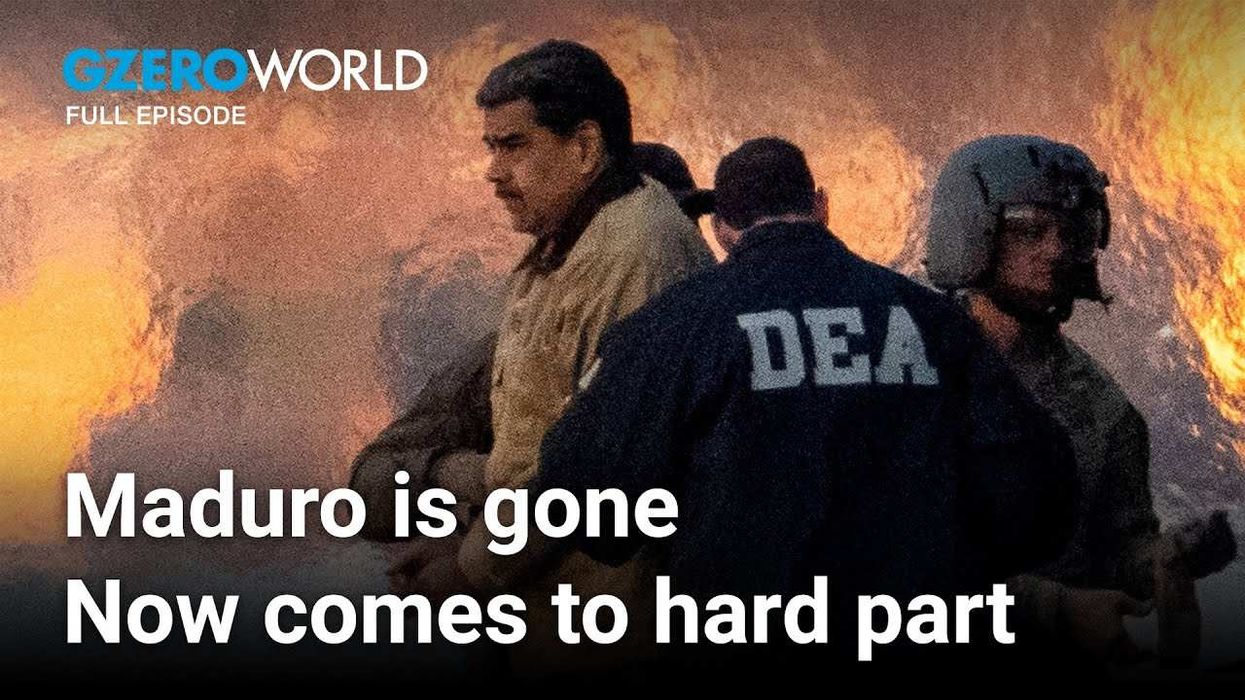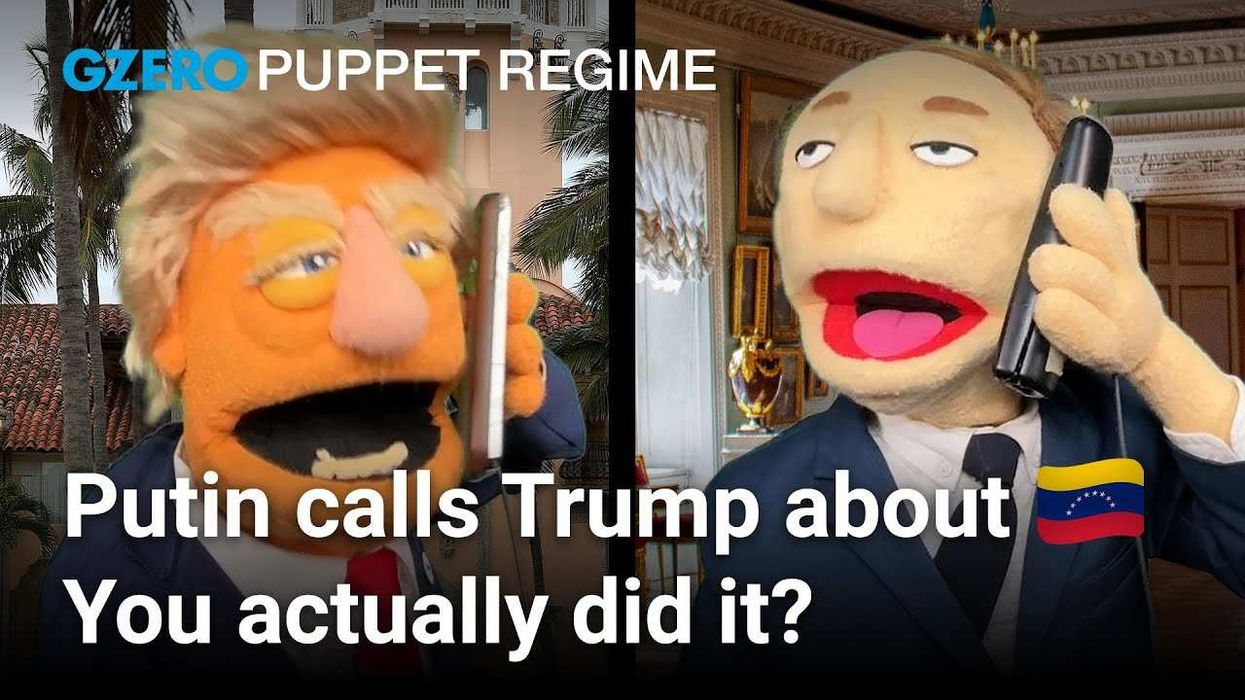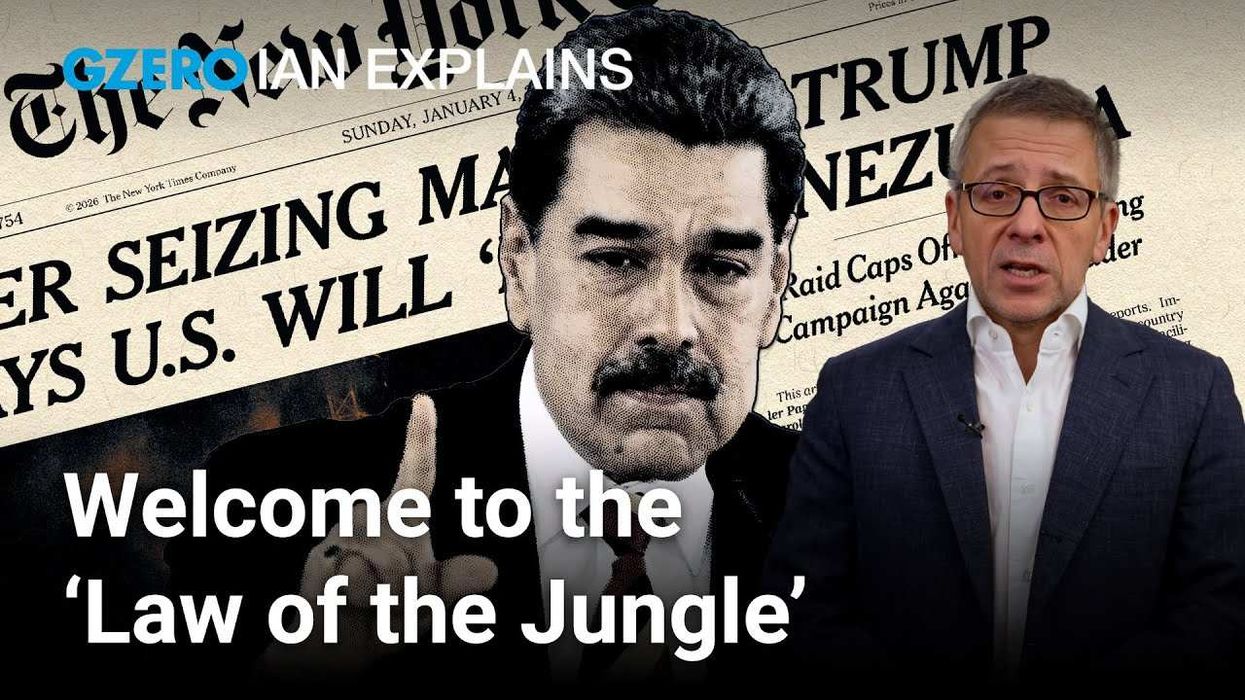VIDEOSGZERO World with Ian BremmerQuick TakePUPPET REGIMEIan ExplainsGZERO ReportsAsk IanGlobal Stage
Site Navigation
Search
Human content,
AI powered search.
Latest Stories
Sign up for GZERO Daily.
Get our latest updates and insights delivered to your inbox.
Top Risks of 2026
WATCH RECORDING
Ian Bremmer's Quick Take:
Hi, everybody. Ian Bremmer here, kicking off your week. A little Quick Take. Thought I would talk about Cuba, not a country we talk about all that often. Communist state, Raúl Castro just stepped down, and the biggest demonstrations across the entire country in decades. Talking about absence of vaccines, problems in healthcare, but also anger at the poverty, the economic mismanagement, the reality of the lack of liberty of living in a communist regime.
The Trump administration had put pretty significant sanctions back on after Obama tried to loosen up. I expect that this is going to make Cuba a bigger issue for lots of folks in the United States that would like to see the back of this Cuban regime. The question is, how does the United States try to address it? Does it shut the Cubans down even harder, make the country pay economically for the fact that they are treating their people so badly or does it use this as an opportunity to open up? I'll tell you.
I've actually done a fair bit of work on issues of sanctions and countries around the world, because there are two types of political stability. You have countries that are stable because they're open like Canada or Germany or Japan, or even the United States. And then you have countries that are stable because they're closed like Saddam Hussein's Iraq. Or like Gaddafi's Libya, or like Kim Jong-un's North Korea. And of course, Raúl Castro's Cuba. And if you are a country that is stable because you're closed, you generally want to stay closed. And the reason for that is because if suddenly you get lots of capital and movement of people and ideas and trade between your closed country and open countries around the world, the people inside your country want more liberty. It is harder to maintain political control in that environment.
We see that going on in Belarus with President Lukashenko. We've seen it going on in Cuba. It's why when the United States tries to move towards openness with Cuba, the Cuban government itself, they want the money, but they resist the idea of lots of foreign direct investment coming into Cuba because the United States is so much bigger. This is the advantage that the Americans have. It's not like the United States versus China, where you bring the Chinese into the WTO, but they're so large they still have the ability to maintain significant controls over what their people see and do and experience. And increasingly with technological controls surveilling the entire population, they can consolidate communist control even though there is a level of state capitalism and private engagement in China.
In the case of Cuba, opening up the borders would mean a massive amount of trade overwhelming what the Cuban government could have influence over a massive amount of tourism and the engagement with the average Cuban citizen would be much greater. I would argue that the reason why the communist regime has persisted for 62 years has precisely because they've been allowed to maintain isolation supported by the United States because of that sanctions regime. Lots of reasons for it, lots of Cuban emigres that were so angry at the Castro regime that would not tolerate any level of opening up of those sanctions, but those people are largely gone now.
There's a lot of private sector folks in the United States that would love to have access purely not because they're interested in liberty, but just because they want to make money in Cuba. I would argue that if you were able to take advantage of the size and scale of the American economy, its investment capacity, its trade capacity, its demand for things like Cuban medical expertise and the doctors and nurses that could serve the American market, I mean even the old Cuban vintage cars that would all be repaired and suddenly sold in the American market. The impact that would have for the Cuban political system would be immense. And I would suspect that you'd have a much quicker move towards regime change from the grassroots of the Cuban people, as opposed to the failed efforts by the CIA and others historically that never seemed to go all that well for the United States.
Anyway, something to think about. Certainly, a debate we're going to have in a more direct way in the United States because thousands of Cuban citizens are taking their lives in their hands by demonstrating across the country this weekend. Hope everyone's doing well, and I'll talk to you all real soon.
Keep reading...Show less
More from Quick Take
Europe takes control of Ukraine’s future
December 15, 2025
Trump’s new national security strategy targets Europe
December 08, 2025
Trump, Russia, and a deal Ukraine can’t accept
December 02, 2025
Europe divided as US pushes Ukraine-Russia peace deal
November 24, 2025
Trump escalates sanctions against Russia
November 10, 2025
Is Abu Dhabi becoming the global capital of AI development?
November 02, 2025
What the Trump-Xi meeting means for US-China relations
October 30, 2025
Trump’s East Wing demolition, Binance pardon, and tariffs on Canada
October 27, 2025
Trump brokers peace: Hostages freed and guns fall silent in Gaza
October 13, 2025
Trump's role in brokering Israel-Hamas deal
October 09, 2025
America’s short-term wins vs. long-term risks
October 06, 2025
Israel is facing real consequences over Gaza annexation plans
September 29, 2025
Is Israel risking global isolation over Gaza?
September 22, 2025
Charlie Kirk's assassination will make things worse in the US
September 15, 2025
Russia-Ukraine war escalation
September 08, 2025
China’s push for a new world order
September 02, 2025
Is the US preparing to strike Venezuela?
August 27, 2025
Is American capitalism still capitalism?
August 25, 2025
Zelensky, Trump, and NATO: A united front on Ukraine?
August 18, 2025
Trump and Putin to meet in Alaska to discuss Ukraine
August 11, 2025
US government rescinds West Point role for former cyber director
August 04, 2025
US-EU trade deal marks a win for Trump
July 28, 2025
The US, China, and the critical minerals question
July 21, 2025
Epstein conspiracies divide Trump's MAGA base
July 14, 2025
US-Brazil relations in crisis
July 10, 2025
Elon Musk vows to start a new political party
July 07, 2025
What Zohran Mamdani’s win really signals for US politics
June 30, 2025
Iran's retaliation shows strategic weakness
June 23, 2025
US enters war with Iran: What comes next?
June 22, 2025
Iran looks to negotiate ceasefire
June 16, 2025
Elon vs. Trump: Billionaire fallout goes public
June 06, 2025
Elon Musk steps down from Trump administration
May 29, 2025
Trump's weekend of geopolitical success
May 12, 2025
Can Trump and Carney reset US-Canada relations?
May 07, 2025
Trump’s ‘less is more’ message is un-American
May 05, 2025
Ian Bremmer on Trump's first 100 days
April 28, 2025
Trump’s America: A kleptocracy but not a police state
April 23, 2025
Inside the Harvard-Trump showdown
April 21, 2025
Can the US win by undoing globalization?
April 14, 2025
Who benefits from Trump's tariff wall?
April 07, 2025
Trump's tariffs & the end of globalization
April 03, 2025
Leaked Signal chat shows Trump team's mindset
March 26, 2025
What Trump team's war plans leak revealed
March 25, 2025
Is Europe in trouble as the US pulls away?
March 24, 2025
Putin-Trump Ukraine call is a small win for both sides
March 18, 2025
What will Trump offer Putin in Ukraine ceasefire talks?
March 17, 2025
Ukraine ceasefire deal now awaits Putin's response
March 11, 2025
Can Europe broker a Ukraine ceasefire?
March 03, 2025
What Trump-Zelensky fallout means for Ukraine war
March 01, 2025
Why the US-Ukraine minerals deal changed
February 26, 2025
Germany's close election limits its ability to lead Europe
February 24, 2025
Ukraine hopes for Europe's help as US negotiates with Russia
February 18, 2025
JD Vance stuns Munich conference with critique on European democracy
February 14, 2025
Trump-Putin chat over Ukraine "deeply" worries Europe
February 13, 2025
What is Trump's Gaza playbook?
February 10, 2025
Why cutting USAID will hurt American foreign policy
February 05, 2025
Why is Trump starting a trade war with Canada?
February 02, 2025
How Trump's assertive foreign policy impacts international relations
January 27, 2025
Trump's Davos address sets up big shifts in US strategy
January 24, 2025
From Davos: How global leaders are grappling with Trump’s return
January 20, 2025
Ian Bremmer on the forces behind the geopolitical recession
January 17, 2025
What Greenlanders might want from a deal with Trump
January 13, 2025
New Year's Day terror attacks highlight America's divisions
January 03, 2025
GZERO Series
GZERO Daily: our free newsletter about global politics
Keep up with what’s going on around the world - and why it matters.















































































